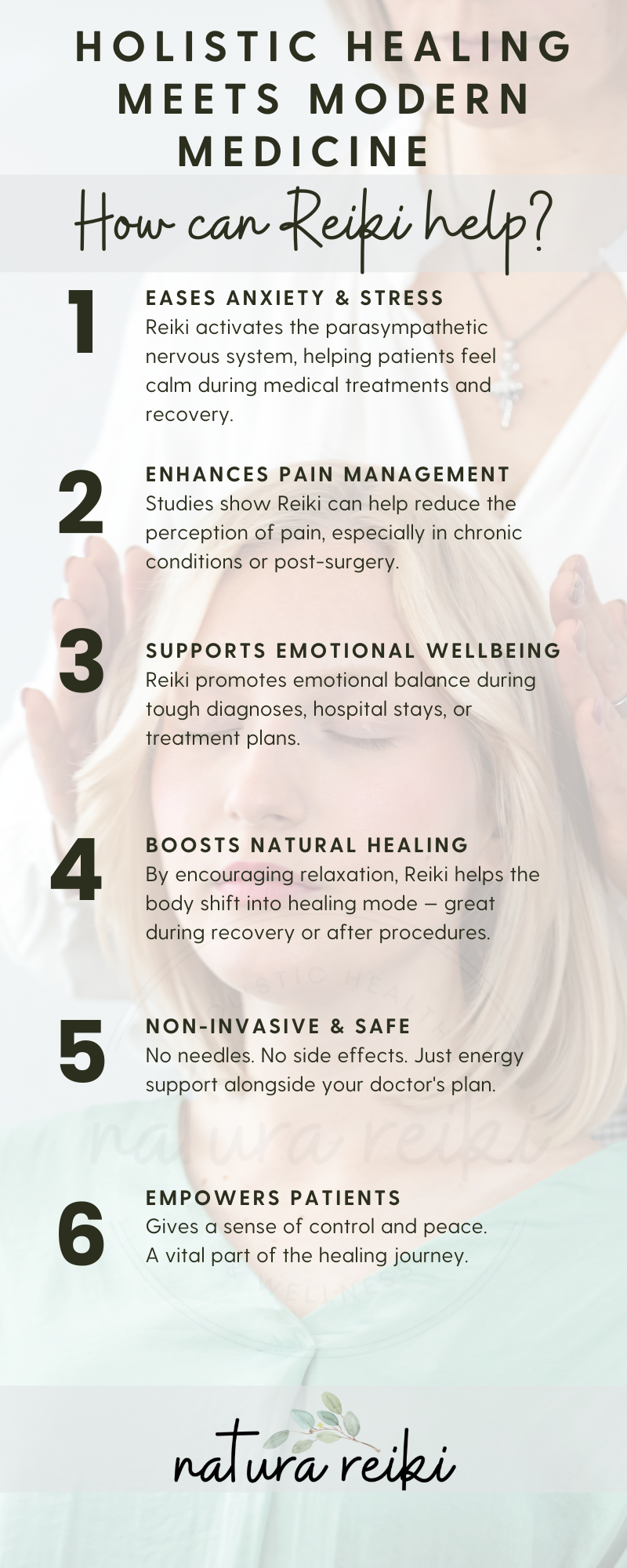How Reiki Supports Medical Treatment: A Complementary Approach to Healing
There’s a growing partnership in the world of healing: Reiki and Western medicine. It may not be a traditional match in textbooks, but together, they offer a more complete approach to healing. One that honours both science and the subtle art of energy support.
Reiki is not a replacement for doctors, scans, or carefully tailored treatment plans. However, it is a powerful support system that can ease stress, encourage recovery, and promote a deeper sense of well-being, physically, mentally, and emotionally.
Let’s take a closer look.
Creating Calm in a Time of Crisis
Illness, no matter the scale, often brings fear and uncertainty. Stress levels rise, the nervous system gets overactivated, and healing can slow down. Reiki helps guide the body into a calmer state, shifting from fight-or-flight into rest and digest.
Many clients report feeling an immediate sense of peace during sessions:
"After just one session, I felt calmer than I had in weeks. It helped me sleep again. And that changed everything." - Miriam, breast cancer survivor
That calm is not just pleasant, it’s biologically beneficial.
Gentle Support for Pain Relief
Reiki doesn’t replace medication, but it complements it beautifully. Clients often experience less discomfort, fewer side effects, and an easier time managing chronic pain.
"I was recovering from spinal surgery, and the pain was intense. Reiki gave me moments of peace I didn’t think were possible. It became part of my recovery routine." — Jamie, post-op client
This gentle approach helps the body release tension and often leads to improved pain tolerance.
Emotional Healing During the Journey
Reiki isn’t just for the body — it supports the heart and mind, too. It’s common for emotions to surface during sessions, giving people a safe space to process fear, grief, or fatigue.
"Reiki became my emotional anchor. I cried, yes, but I also laughed and I felt like myself again." — Lara, autoimmune diagnosis
In a time when patients often feel reduced to symptoms and test results, Reiki offers a reminder of their wholeness.
Recovery That Feels Empowering
When people are calm and supported emotionally, their bodies respond more efficiently to healing. Reiki encourages the immune system to function optimally, supports oxygen flow, and enhances natural repair processes.
"I used Reiki alongside chemo with my oncologist’s support. I bounced back quicker than anyone expected. And I truly believe Reiki played a role in that." — Zoe, cancer patient
This isn’t magic, it’s the parasympathetic nervous system finally getting the space to do what it’s designed to do.
Backed by Research — and Growing Respect
Reiki’s reputation is shifting. Once dismissed as “woo-woo,” it’s now being studied more seriously and with promising results. Research shows Reiki can:
Reduce anxiety and depression
Improve sleep
Ease pain and fatigue
Lower heart rate and blood pressure
We’ve explored these studies in previous blog posts, and more are emerging as medical professionals and institutions open their doors to energy work.
Even hospitals are integrating Reiki into palliative care, oncology, and surgery recovery programs. Why? Because it just works.
Feeling Involved in Your Own Healing
Reiki gives people something powerful, a sense of agency. Instead of passively receiving treatment, clients get to actively participate in their healing. Even if it’s simply by showing up, closing their eyes, and allowing energy to flow.
"It helped me feel like I was doing something for my body, not just to it. That shift changed everything." — Marcus, long-term illness client
Reiki doesn’t replace medical care, but it’s a powerful support that eases stress, supports recovery, and nurtures overall well-being — body, mind, and spirit.
Final Thoughts
Reiki isn’t a substitute for medical care, it’s a meaningful companion to it. It’s the quiet space between appointments, the breath between procedures, and the gentle reminder that healing is not just physical.
If you’re navigating a health journey or supporting someone who is, Reiki may be the calming, strengthening presence you didn’t know you needed.
More than a trend, it’s becoming a movement. And the science is catching up.
Because sometimes the best medicine… is both.


